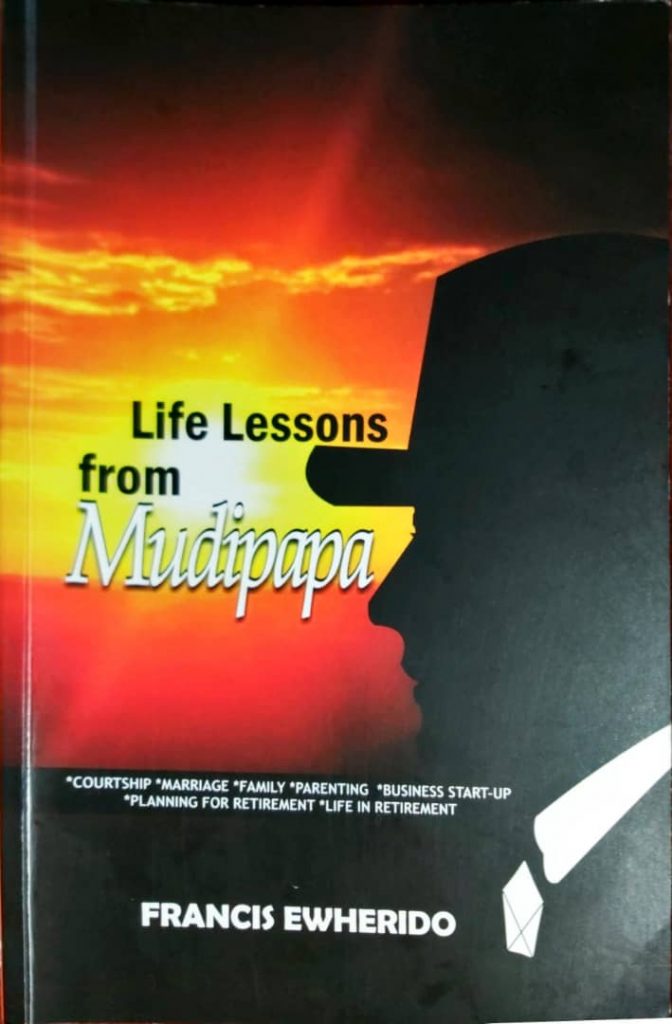Francis Ewherido (2019), Life Lessons from Mudipapa. Lagos: Laddertop Ltd/
Mace Associates Limited. ISBN: 978-978-8033-45-5. 256pp

Is jealousy a lousy and utterly negative emotion that rubs off all
concerned in the wrong way? Could jealousy be a decisive factor in a
relationship? Could it be an indicator of something worthwhile?
The word has negative associations. The Cambridge Dictionary defines
it as “a feeling of unhappiness and anger because someone has
something or someone that you want”. Synonyms are envy,
enviousness, covetousness, desire and resentment.
In Life Lessons from Mudipapa, Francis Ewherido urges a more
nuanced appreciation of jealousy as a positive if not a virtue when
applied in the right proportions. “Jealousy is like any other genuine
feeling we have for what belongs to us. Done in moderation, it is okay;
but taken to the extreme, it gets you into trouble. Everybody who cares
for his/her spouse harbours some degree of jealousy.”
He adds: “Many people use the words envy and jealousy
interchangeably, but it was not always so. Hitherto, jealousy was seen
as protecting what is yours, while envy was the act of desiring what
belonged to another. Jealousy is of God. What do you think the first and
second of the ten commandants are all about? God is trying to protect
his people. He is telling us he does not want to share us with the devil.
He wants no competition for our love for Him.”
Life Lessons from Mudipapa is an ambitious project aimed at
transferring the teaching notes of a marriage counsellor and platform
speaker into a compelling narrative that entertains, informs and instructs.
Ewherido chooses the novel format as a vehicle for this task. The
skeletal frame is the story of Chief Mudiaga Orien.
Mudiaga Orien becomes Mudipapa because of one of his daughters in
her infancy. She blurted out as little children do in her search for clarity
and meaning, “You say your name is Mudi, but mummy says you are
papa. So, you are Mudipapa,”
Life Lessons from Mudipapa centres on marriage and family life. It
covers the life choice of Mudiaga against a vocation in the priesthood
following an assessment of his strengths and weaknesses, his search
for a life partner and the journey of matrimony and building a family. We
follow his quest for a partner and the failures, his successful union with
EseOghene, his wife, and their efforts at raising their family, starting a
business, his unfruitful endeavours as a business owner and the lucky
break of paid employment with a big multinational.
He grows in his job, rising to Finance Director. The challenge of caring
for their young children forces EseOghene to set up a creche which
became very successful. Mudipapa buys land in Agbara Estate enough
to house their house and a big school. They face the tough decision of
selling their creche and moving over to Agbara where they set up the
Orien International School. It became an even more significant success
and a legacy. We follow Mudipapa until retirement after successfully
training his children to acquire first degrees in Nigeria and postgraduate
qualifications abroad.
The book treats courtship, marriage, family, and parenting. It also
tackles business start-up, planning for retirement and life in retirement,
as the cover and blurb promise. It does more.
“Imaginative literature primarily pleases rather than teaches”, Mortimer J
Adler and Charles Van Doren asserted five decades ago in their classic
“How To Read A Book: The Classic Guide to Intelligent Reading. The
great achievement of Life Lessons from Mudipapa is combining
imaginative literature with didacticism. It is usually a tall order to do so,
and the strain shows in passages of the book where the teaching notes
of Mudipapa dominates the story and takes the reader to sessions on
various lessons in marriage and family. The author pulled it through.

